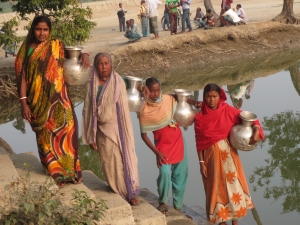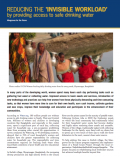Gender Equality in Development Cooperation
Location: Bangkok, Thailand. 31st Mar 2016
The project titled ‘Promoting accessibility to safe drinking water for the vulnerable community in Kultoli village’, was implemented through a local organization, Nakshikantha Mohila Unnayan Sangstha, in a village in Shyamnagar, Bangladesh. The project focused on rehabilitating local freshwater sources for village locals who were facing scarcity of fresh water for consumption due to an increase in shrimp farming and high levels of salinity in the Chuna River. But the project achieved multiple benefits beyond this.
Women of the village, who were traditionally tasked with collecting freshwater for the family, spent up to two hours of their day walking three kilometers to the nearest clean water source. By re-excavating ponds and building a reservoir only 250 meters from their houses, the time needed to collect water was reduced to half an hour a day, saving two-and-a-half hours of the women’s time each day. Time saved in collecting potable water was redirected to productive work within the village and the once ‘invisible work’ of women and children became visible and recognized.
Read more: Reducing the "invisible workload" by providing access to safe drinking water.
Read more about MFF’s Gender Equality initiatives here.

Fetching daily drinking water from far away ponds is a daily ... , Shyamnagar, Satkhira, Bangladesh © IUCN, 2014
Related Documents

Reducing the ‘invisible workload’ by providing access to safe drinking water
Author: Mangroves for the Future
Posted on: 31st Mar 2016
Category: MFF Partner (Institution)
Size: 109 KB